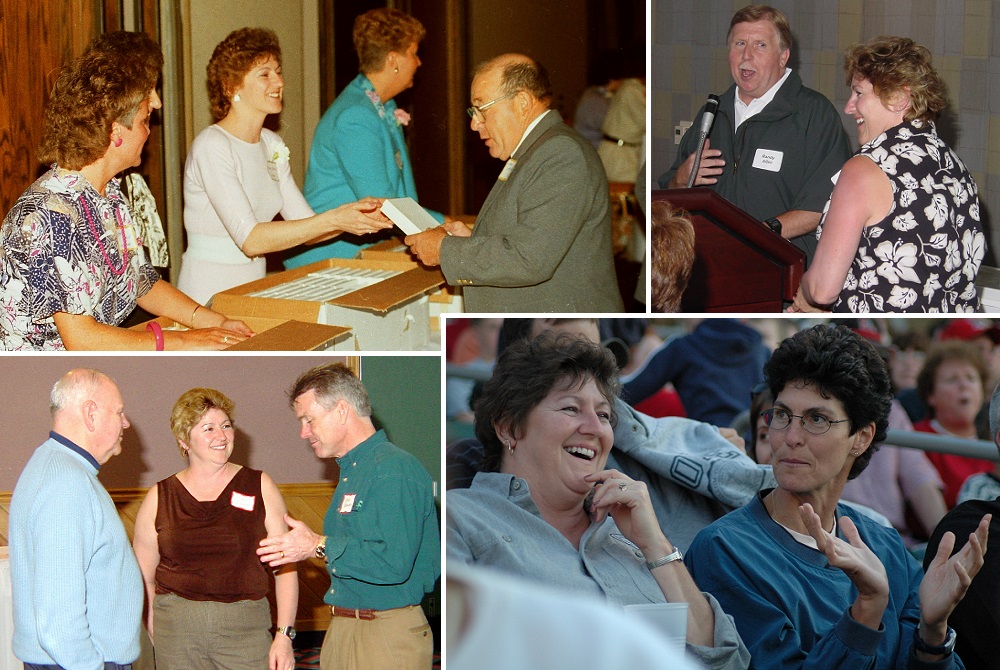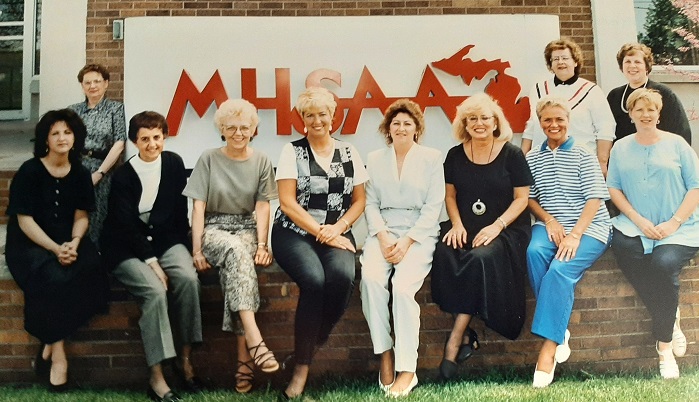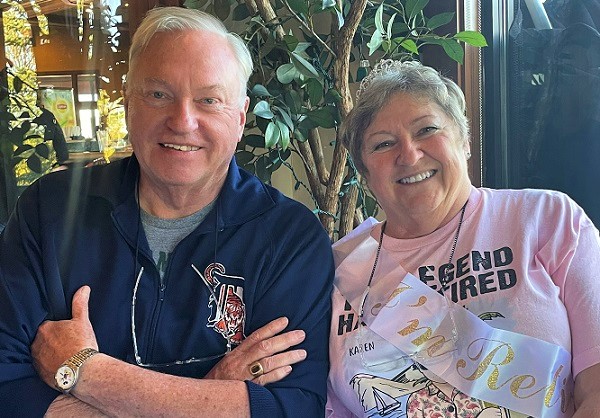
Rep Council Wrap-Up: Spring 2012
June 28, 2012
In addition to authorizing a vote of its membership to allow for waiver of its maximum age rule under certain circumstances, the Representative Council of the Michigan High School Athletic Association also approved a variety of regulations and sports activities policies during its annual Spring Meeting, May 6-7, in Gaylord.
The Spring meeting of the 19-member legislative body of the Association’s over 1,500 member schools is generally the busiest of its three sessions each year. The Council considered 33 committee proposals and also dealt with a variety of eligibility rule, post-season tournament and operational issues.
A couple of the most visible changes will take place in ice hockey beginning with the 2012-13 school year, which will see longer games in the MHSAA post-season tournament and the addition of a regular-season contest. Tournament games will now have 17 minute periods, something which had been allowed by local adoption for regular season games previously. The regular season game limit was also raised, as the Representative Council approved a Hockey Committee recommendation to reduce the number of scrimmages to one in exchange for the addition of a 25th contest.
Here is a summary of other actions taken at the Spring Representative Council Meeting which will take effect during the 2012-13 school year:
Handbook/Administrative Matters
- By prior mutual consent of competing teams, schools may agree to vary the color of game uniforms to commemorate events or causes important to those schools, provided all other uniform specifications are followed. The wearing of pink and camouflage uniforms, for example, to show support for breast cancer awareness or members of our armed forces wounded in action, among others, have become popular; but previously required advanced approval from the MHSAA.
- The Council approved a revision of the sections of the MHSAA Handbook addressing the sanctioning of meets conducted by non-school organizations or individuals and large interstate meets. They now reflect the requirements of the National Federation of State High School Associations, as well as previously unstated policies and procedures of the MHSAA.
- In junior high/middle school matters, the Council revised the Handbook so that schools may decide to allow student-athletes in the 7th and 8th grades to be members of an interscholastic team in more than one sport at the same time; and to allow a student who will exceed the maximum age limit as a 7th or 8th grader to apply for “Eligibility Advancement” while in 6th grade to begin a maximum of two years of junior high/middle school participation.
Sports Matters
- Responding to situations where celebrations by student-athletes and spectators have resulted in property damage at MHSAA post-season tournaments, the Council approved the following language for inclusion in participating team and tournament managers materials addressing team and spectator conduct.
- During contests, officials will penalize under applicable sportsmanship or playing rules those student-athletes or coaches who leave the field of play and contact or approach spectator areas for celebration.
- Each tournament manager or the MHSAA Staff may determine an acceptable number of crowd supervisors necessary for each school, dependent on the situation, including inappropriate celebrations and other crowd control issues.
- The cost for repair of replacement to facilities damaged as a result of participant and/or spectator conduct shall be paid by the school involved directly to the host facility within 30 days of the bill being submitted to the school. MHSAA reimbursement or revenue sharing will be withheld until paid by the offending school. Future tournament hosting privileges or school reimbursements to offending schools may be withheld if payment is not made.
- In Golf, the Council approved a committee recommendation to allow coaching contact for one designated coach during MHSAA tournament competition on all areas of the course, except when players reach the green. The school designated coach must be identified and approved by the school prior to the MHSAA tournament. Coaching privileges may not be transferred to persons not approved and designated by school administration. A committee recommendation to exempt one qualifying round of the Michigan Amateur Tournament from the limited team membership rule beginning in 2013, replacing the exemption approved in 2010 for the two U.S. Open qualifying stages, was adopted.
- In Boys Lacrosse, a committee recommendation to limit entry in the MHSAA post-season tournament beginning in 2013 to those schools that play no fewer than 50 percent of their regular season schedule against other MHSAA member school teams was approved.
- In Soccer, the Council did not adopt a National Federation rule adoption that eliminates a substitution for a player who receives a second yellow card. This action affects the 2012-13 school year only during which the Soccer Committee will consider this rule change further and its impact on Michigan’s ten-minute sit-out rule following a yellow card.
- A second day of weigh-ins will take place at the MHSAA Team Wrestling Finals, which will be independent of the previous day’s weigh-in, and all competitors would be given a one-pound growth allowance for consecutive days of weigh-in. The Council also approved a Wrestling Committee recommendation to permit wrestling practice to begin two Mondays before Thanksgiving. The first day of competition does not change.
The Council also reviewed reports on membership, with 763 senior high schools and 768 junior high/middle schools in 2011-12; eligibility advancement applications, which totaled nine for the year; the use of Educational Transfer Forms, which was stable this year; school violations, which declined significantly; attendance at athletic director and coaches in-service workshops; officials’ registrations, topping the 12,000 mark again; rules meeting attendance; and officials reports submitted for the past three sports seasons. The Association’s $9.8 million budget for the 2012-13 school year was also approved.
The Representative Council is the 19-member legislative body of the MHSAA. All but five members are elected by member schools. Four members are appointed by the Council to facilitate representation of females and minorities; and the 19th position is occupied by the Superintendent of Public Instruction or designee.

Jackson's Imprint on MHSAA Stretches 45 Years, Across 4 Executive Directors
By
Geoff Kimmerly
MHSAA.com senior editor
October 5, 2022
First impressions can be significant, as many a saying goes. And Karen Brown unknowingly provided one in 1978 that helped affect the course of athletics in this state over the next 40-plus years.
A Michigan State University student named Karen Leinaar had shown up at the Michigan High School Athletic Association for a meeting about a 5K road race she was planning that was unrelated to the MHSAA except that the building provided a good meeting place – and Brown, just a year out of high school, was the first person to greet her at the old Trowbridge Road headquarters.
Seeing someone her age immediately made Leinaar more comfortable. She ended up returning to that office several times over the years, registering as an MHSAA game official while still an MSU student and then starting a career in 1982 that has included nearly 40 years as a high school athletic director and two decades of shaping policy as part of the MHSAA Representative Council.
That’s the kind of impact that’s emanated from Karen Jackson, formerly Brown, and over the last 45 years as assistant to four of the five executive directors during the MHSAA’s 98-year history. Jackson finished that run with her retirement Friday.
“She was always one that would welcome you, and whether you walked into the office or called on the phone, she always had an answer that would calm you down or provide you with the information you needed,” said Leinaar, who currently is serving as interim athletic director at Frankfort High School in addition to her duties as executive director of the Michigan Interscholastic Athletic Administrators Association.
“I remember initially calling and needing something from Mr. Norris – it was always Mr. Norris – and she could answer the question,” Leinaar added, referring to retired MHSAA executive director Vern Norris, who served in that role from 1978-86. “You didn’t want to talk to scary Mr. Norris – Vern was a wonderful man, but he was like the superintendent or principal. Karen always had the answer. … It was always that smile that made you feel like you were more than welcomed, wanted in the office, and everything is going to be OK.”
 Jackson began at the MHSAA in June 1977, two days before her graduation from long ago-closed Harry Hill High School in Lansing.
Jackson began at the MHSAA in June 1977, two days before her graduation from long ago-closed Harry Hill High School in Lansing.
Her high school sports career amounted to about half a season on the Hill varsity volleyball team as a sophomore before she had to switch gears to begin working for the Lansing Regional Chamber of Commerce as part of a school co-op program.
Jackson graduated as a co-valedictorian of Hill’s Class of 1977. Despite her academic standing, she hadn’t received much guidance at school on the possibility of college. But she had a job offer from the Chamber – and also had heard from grade-school friend Deborah Norris (Vern’s daughter) about an opening at the MHSAA.
The MHSAA was offering more money, and Jackson was hoping to buy a car – and so at 18, she became the secretary for executive director Allen W. Bush.
The title has changed over the years, from secretary to the executive director, to executive assistant, to senior executive assistant. The MHSAA’s administrative processes obviously have changed, mostly because of technology, from everything done on paper and through the mail to just about everything conducted digitally over the internet.
But many of Jackson’s most important duties at the end of her tenure resembled those she was hired to carry out nearly half a century ago.
Setting Exemplary Expectations
Bush retired a year after Jackson began, and she then assisted Norris for his eight as executive director. She served with Jack Roberts through his 32 years as executive director from 1986-2018 and then for these first 3½ under current director Mark Uyl.
She was considered the “baby” of the MHSAA staff during her first 12 years, until she turned 30 and her support staff teammates declared she wasn’t the baby anymore during a Christmas party serenade. Just about 33 years later, she’s leaving as one of two people left who worked in the old offices before the MHSAA moved to another East Lansing headquarters at Ramblewood Drive in 1996.
School sports happen thanks to a Karen Jackson or two in every community -- people who provide the unseen support that makes these programs possible every day.
For the last 45 years, she’s provided a consistent anchor for service to 1,500 schools and millions of student-athletes across Michigan.
 “She’s shaped so much of what we’ve done,” said MHSAA assistant director Kathy Vruggink Westdorp, who joined the staff during the 2003-04 school year after more than two decades working for Grand Rapids-area schools. “Her service to schools was imperative to what she was doing, and it was a valuable part for our membership. Hers was such a dedicated service, such an exemplary service – finding solutions, to do what’s needed.”
“She’s shaped so much of what we’ve done,” said MHSAA assistant director Kathy Vruggink Westdorp, who joined the staff during the 2003-04 school year after more than two decades working for Grand Rapids-area schools. “Her service to schools was imperative to what she was doing, and it was a valuable part for our membership. Hers was such a dedicated service, such an exemplary service – finding solutions, to do what’s needed.”
There are file cabinets and libraries and hard drives at the MHSAA office, the contents of which are known by only a handful of people on Earth – and Jackson perhaps the most as she did most of the sorting and maintaining of those files over the years.
For a 1996 Lansing State Journal feature on the MHSAA’s support staff, Jackson (then Yonkers) explained “there are always new challenges, new issues and controversies. It never gets boring. In the past 19 years, we’ve slowly shifted from dealing with athletic administrators, principals and superintendents to dealing with legislators, attorneys and courts.”
The last 25 years has seen much of the work swing back to providing service directly to schools. And Jackson’s mind has become part MHSAA library and part card catalog of where to find those few snippets she might not recall immediately from the last half century.
“I guess what I’m proud of is being able to find things, to know where to find things and how to find things that other people don’t,” Jackson said. “Yes, the technology has changed everything. … We used to have more schools – they used to have 40-some Detroit public schools – and there was a whole era of (litigation), but it’s calmed down now.
“I liked what I did, and it kept me on my toes – that’s for sure.”
The MHSAA is rooted in its responsibilities as a championship and eligibility rules maker, and Jackson was involved in just about every communication in those areas during her time. Tournament changes are made at Representative Council meetings, and she’s reported the minutes for at least 150 of those, including piles of special sessions as the MHSAA managed sports through the COVID-19 pandemic. Eligibility waivers are requested at Executive Committee meetings, and she’s prepared somewhere north of 505 sets of minutes for those monthly sessions even as those agendas have grown in content substantially over the years.
Then there’s all of the correspondence from those four executive directors – all with the initials “kb” or “kj” to go with “AWB” or “VLN” or “JER” and “MU.” She also was in charge of MHSAA election ballots for 35 years, served as the lead organizer of cooperative programs, helped with football tickets for a time and briefly was part of the program-selling crew at early Football Finals at the Pontiac Silverdome.
“I think I’m pretty lucky, being on the Council and Executive Committee, that I’ve been able to work with her a lot. And most athletic directors, they may not even know who she is because they may not have contact with her or do anything with her – but she’s obviously been the unsung hero of that office,” said Vic Michaels, who serves as director of physical education & athletics for the Archdiocese of Detroit and has served on the Representative Council since 2003.
“She just does so much that you don’t really know about, especially with the Council. Whenever I need anything, Karen’s the one I call. She is the history, really. She’s the keeper of that.”
Unprecedented & 'Never to be Replicated'
A longtime co-worker of Jackson, Shirley Hytinen, retired in 1998 after just a few months more than 43 years. She too had worked for four executive directors, as she began in 1955 during the Charles E. Forsythe era.
Jackson surpassed Hytinen’s tenure a few years into Uyl’s, and can readily recall some of what stood out from all four directors she’s assisted.
Bush was “really stern” – he had served in the U.S. Marines – and she said he didn’t smile much until the day he announced his retirement, when it was “like a switch turned. He was smiling and happy and joking around.”
Norris was “the sweetest guy in the world.” Jackson had bought her first house in her mid-20s and was preparing to move in with only her dad and his motor home to assist, when Norris showed up to help at 7:30 a.m. that morning to provide another set of hands.
Roberts is known by Michigan administrators and national colleagues for his writing, and Jackson said jokingly she still “cringes” when she sees a yellow legal pad. She was an important proofreader and spent the majority of her career serving with her desk just a few paces away from that of the recent National Federation Hall of Fame selection, and she attended his induction this past summer and San Antonio.
 Roberts pointed out that during the 1980s, the MHSAA would conduct nine Executive Committee meetings, each averaging fewer than 10 requests for waivers. By the end of his 32 years, there were 11 Executive Committee meetings annually – with approximately 50 waiver requests presented on average. Still, he and Jackson were able to process the meeting minutes and continue to distribute those decisions within 24 hours.
Roberts pointed out that during the 1980s, the MHSAA would conduct nine Executive Committee meetings, each averaging fewer than 10 requests for waivers. By the end of his 32 years, there were 11 Executive Committee meetings annually – with approximately 50 waiver requests presented on average. Still, he and Jackson were able to process the meeting minutes and continue to distribute those decisions within 24 hours.
“Over the more than three decades that Karen and I worked together at the MHSAA, the work became increasingly more voluminous and complicated – and Karen kept finding ways to increase our efficiency and maximize our output,” Roberts said.
Like Norris when Bush was executive director, Uyl had been part of the MHSAA staff under Roberts since 2004 before eventually moving into the corner office. After those first 15 years together, Uyl knew what a valuable person he had just a few yards away to assist in his transition, and “he just says to do this” and allows his staff to run with it, which Jackson enjoyed.
Her duties have been shifted confidently, mostly to Jamie VanDerMoere, another longtime administrative assistant who is best-known to Michigan school sports people for her leadership with the annual wrestling championship tournaments.
Jackson recently was married to Jim Jackson, and they have plans as they close in on their first anniversary – they’re hoping to travel to Italy at some point and also The Masters in Augusta, Ga., next spring. “I’m not going to miss coming to work every day, but the people,” Karen Jackson said.
And many in school sports across Michigan, although they may not realize it, will miss the contributions Jackson has made to their community over the decades including the context she’s provided as thousands of decisions have been made.
“Not only her understanding of our regulations and the processes of our regulations, but understanding why we have those things in place – when someone does something 45 years, you get a lot of historical context,” Uyl said. “What’s made her so effective is understanding the why – and that to me is something that’s almost impossible to replace.
“When an organization has been around 98 years with only five directors, it says something to have worked for four out of the five. That will never be replicated again.”
PHOTOS (Top) From top left, Karen Jackson has been a mainstay of the MHSAA for decades – serving membership, working with administrators like Randy Allen and Gina Mazzolini or serving as assistant to executive directors like Jack Roberts (right) and Vern Norris. (Middle) Jackson, sitting fourth from left, was the “baby” of the MHSAA staff after joining when she was 18. (Below) Jackson and husband Jim have plans to travel in retirement. (MHSAA archives.)

